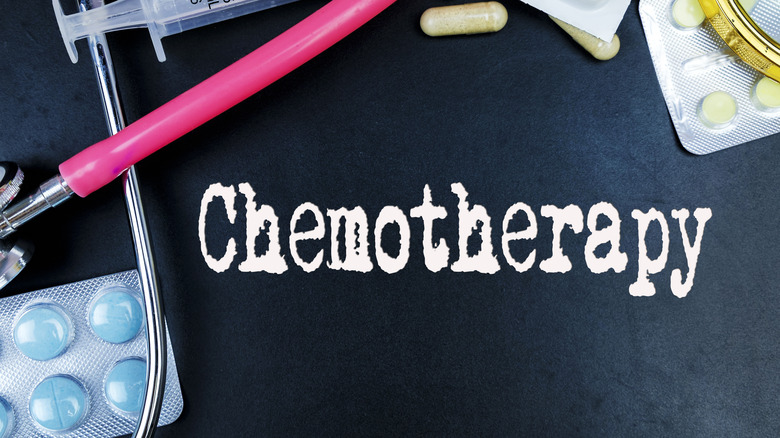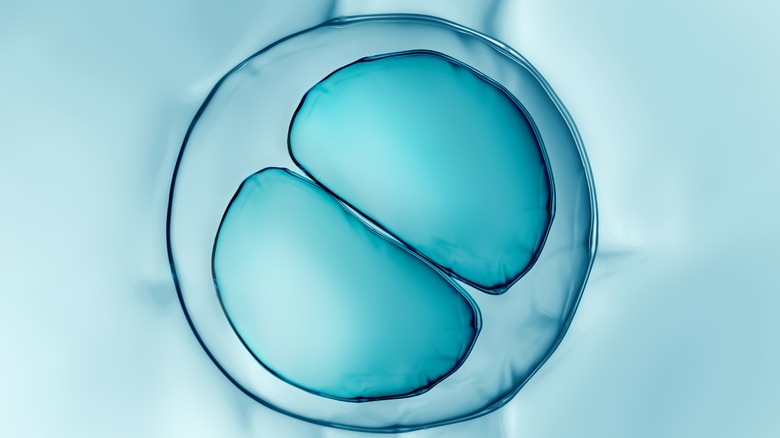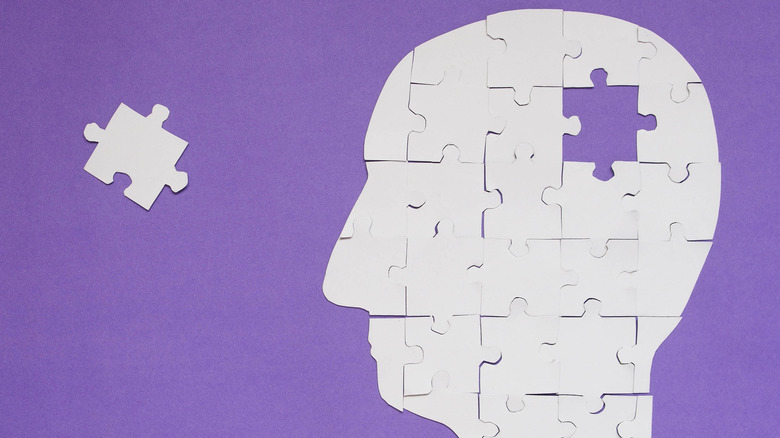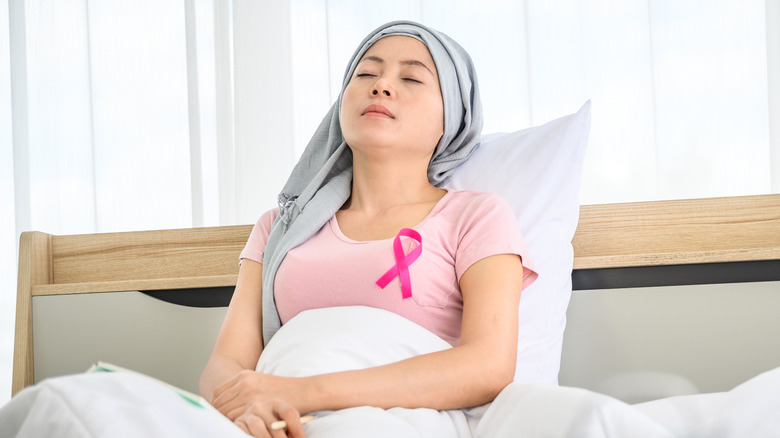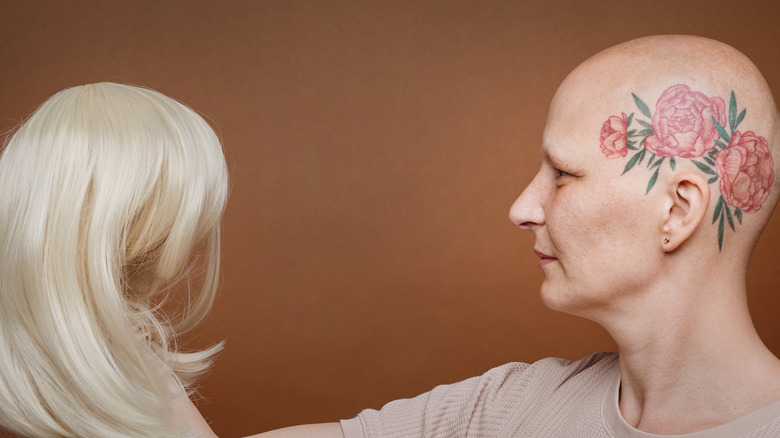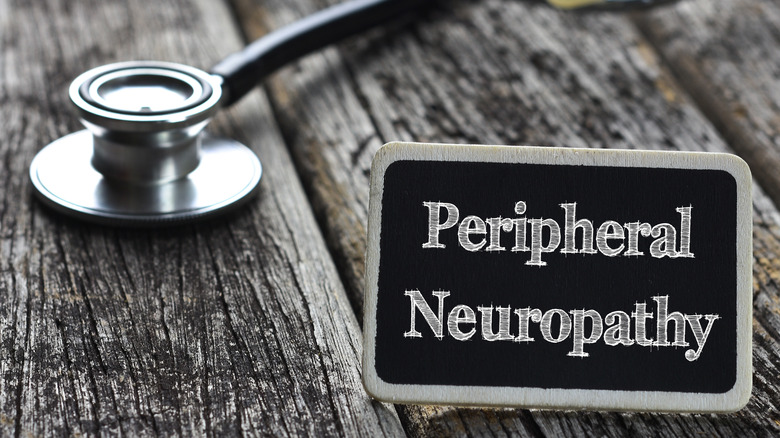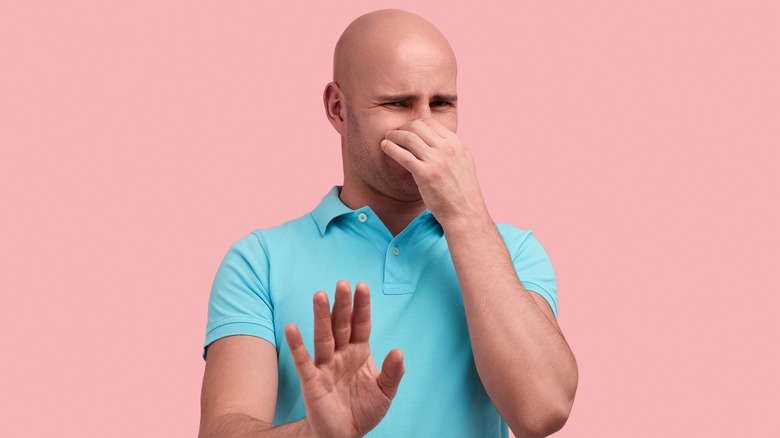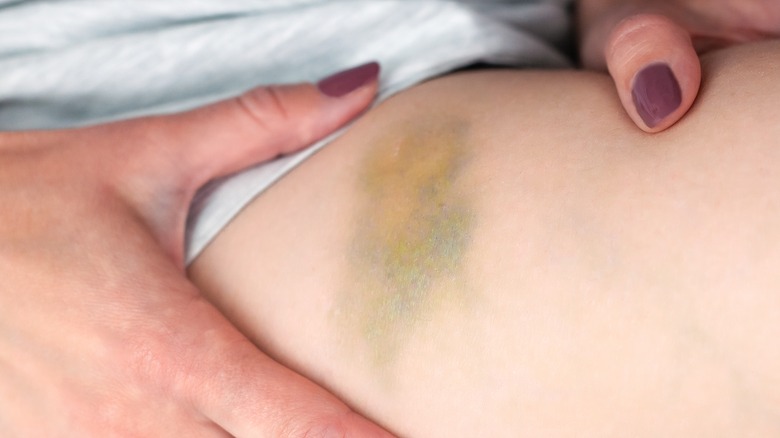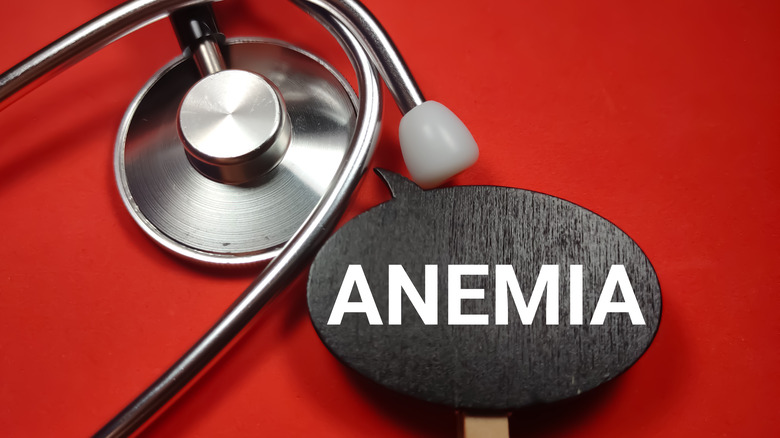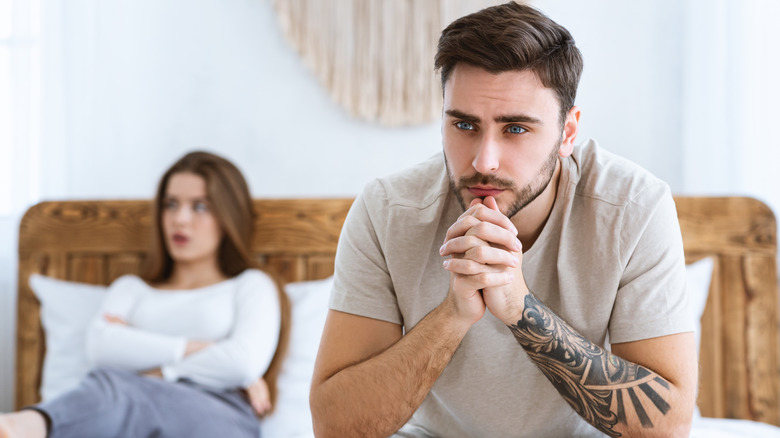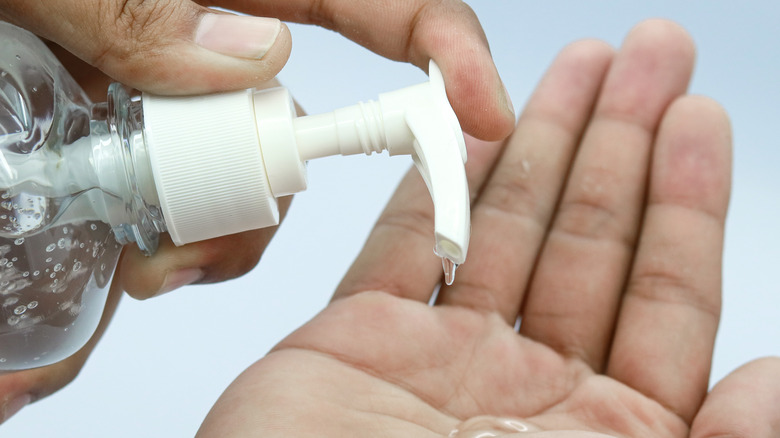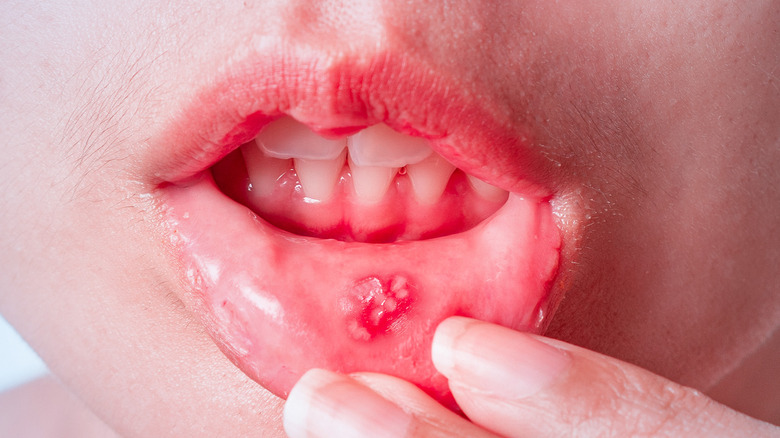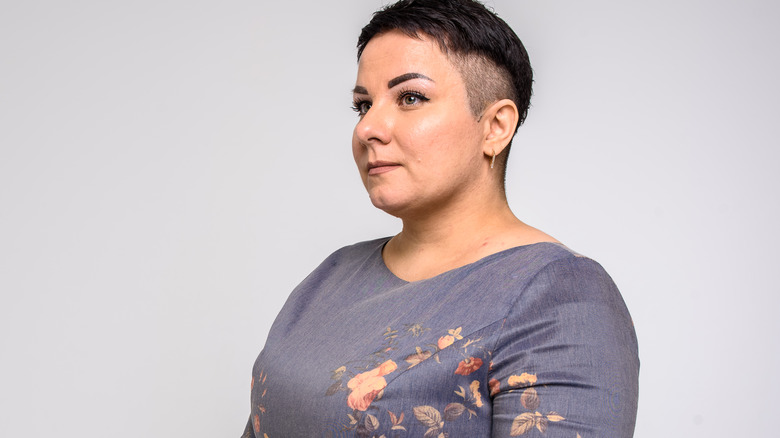What Happens To Your Body When You Go Through Chemotherapy?
Starting cancer treatment for the first time can be a terrifying experience, especially if you are unprepared for the changes that may occur in your body. According to Chemocare, most cancer treatments will include some form of chemotherapy (chemo). Therefore, it is critical to understand what chemo is and how it may affect you. Every cancer experience is unique, and treatment options will differ depending on the type and stage of cancer at the time of diagnosis.
The human body is made up of continuously growing and dividing cells. The body usually eliminates cells that become abnormal or old. Cancer develops when this process fails, and irregular or old cells do not die but multiply and grow, according to the American Society of Clinical Oncology (ASCO). Chemo works by stopping or slowing the progression of rapid cell growth and division in cancer (via the Mayo Clinic). Chemo drugs attack cells at various stages of the cell cycle. The specific type of cancer cells an individual has will determine the kind of chemo prescribed and the treatment schedule.
The ASCO also mentions that chemo can harm healthy cells. As a result, some chemo treatments can have serious side effects. Each drug has different side effects and severity, although some may not cause additional problems. It is essential to speak with your doctor about the potential side effects of the medications you will be given, to better understand what to expect during treatment.
What causes chemo side effects?
Conventional chemotherapy kills rapidly dividing cancer cells, but can also harm healthy cells (via the American Cancer Society). Chemo cannot distinguish between cancer and specific healthy cells; this is where side effects enter the picture. When chemo damages the body's healthy cells, side effects can occur until the healthy cells recover.
According to the National Cancer Institute, some healthy cells (such as those that line the mucous membranes of the gastrointestinal tract) are more vulnerable to chemo, resulting in mouth sores, dental problems, diarrhea, and other digestive issues. Furthermore, blood cells that develop in the bone marrow and hair follicles are impacted because all these cells divide faster than other healthy cells. The goal of chemo is to strike a balance between killing cancer cells and sparing normal cells to reduce side effects.
Every cancer patient reacts differently to chemo treatment, per Yale Medicine. Fortunately, many side effects can now be reduced, if not eliminated, thanks to advances in medical technology.
The chemo brain phenomenon
A study published in Critical Reviews in Oncology/Hematology noted that cognitive impairment in chemotherapy patients is a genuine concern. Chemo brain describes cognitive impairment and a decrease in mental agility. Chemo brain can occur before, during, or after cancer treatment, lasting for months or years. These deficits can be described as mental fog or episodes of forgetfulness.
According to the American Cancer Society, numerous potential factors may contribute to chemo brain, with chemotherapy being a common reason. The term "chemo brain" may appear deceptive, implying that the chemo treatment is the only cause of chemo brain. However, other factors can contribute to cognitive impairment, such as cancer, stress from a new diagnosis, or different treatment regimens.
The National Cancer Institute offers some advice to patients experiencing chemo brain symptoms. These suggestions include making to-do lists, keeping a calendar, and exercising your body and mind by working on puzzles or other stimulating games. It is also critical that your family and friends are aware of your memory problems to support you. Finally, consult your healthcare provider for resources to determine when you or your family should be concerned about your memory.
Chemo-related fatigue
The precise relationship between cancer and chemotherapy-related fatigue is unclear. What is known is that chemo-related fatigue differs from fatigue experienced by people who are not cancer patients. Cancer-related fatigue does not entirely respond to rest and sleep. This is likely because chemotherapy damages healthy and cancer cells, requiring your body to work harder to repair the damage (via the Mayo Clinic).
According to the American Society of Clinical Oncology, chemotherapy can also cause short-term damage to red blood cells, leading to anemia. If your red blood cell count is low, your body may not get enough oxygen. Thus, you might experience increased fatigue. In this situation, as your red blood cell count recovers, your fatigue may improve.
The National Cancer Institute states that chemo-related fatigue typically peaks halfway through treatment and may subside as it ends. If the side effects of chemotherapy include pain, a decline in mental health, and disturbed sleep patterns, fatigue may get worse. Discuss your fatigue and associated symptoms with your healthcare provider; they may be able to recommend medications to help with this side effect.
Nausea and vomiting
According to a research study in American Health and Drug Benefits (AH&DB), one of chemotherapy's most common side effects is chemo-induced nausea and vomiting (CINV). CINV impairs patients' quality of life during treatment and can make it difficult for them to stick to their treatment plan. The severity of the CINV is usually predicted by the specific chemo drug, the combination of drugs, and the length of treatment. CINV can, however, be patient-specific and related to the type of cancer or tumor location. Because many pharmaceutical advances have helped to control these side effects, your healthcare provider can plan for prophylactic treatment to lessen or avoid the impact of CINV. As stated in the study, it can be challenging to treat if CINV is not controlled. It can increase adverse events by causing weight loss, malnutrition, and potential electrolyte imbalances that can be harmful if not treated promptly.
WebMD recommends changing your eating habits during CINV episodes by eating smaller, more frequent meals or keeping flat ginger ale, apple juice, or tea on hand to help settle your stomach. Some dietary changes may help alleviate symptoms that medication may not entirely relieve.
Chemo hair loss
Although hair loss is one of the most common side effects of certain chemotherapies, it is essential to note that it does not affect all patients. Chemotherapies are highly potent medications designed to kill rapidly growing malignant cells and harm rapidly developing healthy cells. Unfortunately, hair cells divide quickly and are easily damaged by most chemotherapy treatments, resulting in temporary hair loss (via Medical News Today).
According to the American Cancer Society, If hair loss is inevitable, you may lose all or a portion of your body hair. This can include your brows, eyelashes, nose hair, pubic hair, and any other hair on your body. This may shock you if you are not prepared. Ask your healthcare team if hair loss is likely and what to expect from your treatment plan. Knowing what to expect will provide you with information that will aid your preparation.
Cancer Treatment Centers of America mentions how you can cope with hair loss. One of the most important things you can do is remember that you are still you, and that this temporary condition does not define you. Talking to your hair stylist about options for preparing for hair loss, such as cutting your hair shorter, may help. Furthermore, seeking support from family and friends and speaking with others who have experienced or are experiencing hair loss may help you feel more comfortable.
Peripheral neuropathy can be a serious side effect
A research study published in the International Journal of Molecular Sciences examines the adverse effects of chemotherapy-induced peripheral neuropathy (CIPN) and the impact these drugs have on up to 85% of patients prescribed them. The most common culprit is platinum-based chemotherapy. Because CIPN can cause long-term complications, discussing potential side effects with your healthcare team before beginning treatment is critical.
According to the American Medical Association, the location and severity of CIPN symptoms vary between patients. Some symptoms include numbness or a "pins and needles" sensation in your hands and feet. Due to loss of sensation or numbness in the hands, you may also have difficulty picking up an object, tying shoelaces, or any activity requiring fine motor skills. Furthermore, ringing in the ears, hearing loss, and vision changes are all possible side effects.
There is no proven way to prevent CIPN, per the American Cancer Society. As a result, symptom management is the primary focus for this condition, as is open communication with your healthcare team if symptoms worsen. Long-term effects of CIPN are possible. Because CIPN has the potential to cause long-term harm, your healthcare provider may modify your treatment plan if your symptoms worsen. Finally, there are medications for CIPN pain that may help alleviate symptoms. Your healthcare provider can discuss the best options for you.
Bowel changes can occur
Your GI tract is one area where cell division is rapidly occurring. Because chemo targets rapidly growing cancer cells, it also affects the cells in the GI tract, causing diarrhea or constipation depending on the type of chemo prescribed (via Cancer Connect). It is common for diarrhea to alternate with constipation, which can be challenging to manage. In a research study published by Frontiers in Pharmacology, diarrhea is a reason for alterations in chemo treatments in approximately 60% of patients, with 22% requiring dose reductions. According to the Dana-Farber Cancer Institute, chemotherapy patients frequently experience diarrhea. It is essential to avoid it by starting antidiarrheal medications as prescribed by your doctor at the first loose bowel movement.
Constipation, on the other hand, can occur during chemo treatment. Constipation is less common than diarrhea, affecting approximately 16% of chemo patients (via Medical News Today). Constipation is more likely to occur if the chemo treatment causes inflammation in the colon or the drug impacts the number of secretions produced in the digestive tract. Lack of fluids, decreased activity, and regular diet alterations can also increase the risk of constipation during chemo treatment. Your physician may prescribe medications to help with diarrhea or constipation and review current medications to ensure that they are not contributing to your predicament.
You may have a loss of appetite, and food may taste strange
It is common for chemotherapy patients to lose their appetite. You might not want to eat, or your desire for foods you once enjoyed may fade. The National Cancer Institute also mentions how side effects of cancer treatment such as nausea and vomiting, mouth sores, or fatigue can decrease food consumption. While this is true, finding alternate ways to manage your nutrition while receiving treatment is essential. Avoiding dehydration is crucial, as it can have many complications in your body. Be sure to drink fluids in small amounts frequently to stay hydrated.
If your taste buds are out of whack or everything tastes like metal, the American Cancer Society recommends using plasticware and glass cups instead of metal. Chewing gum, mints, or hard candy can also help relieve the strange taste that some medications leave behind. Lean on your healthcare team for assistance with this issue. There are medical options they can provide to alleviate unpleasant side effects.
You may notice more bruising or bleeding
According to the American Cancer Society, chemotherapy can result in low platelet counts known as thrombocytopenia. Because platelets aid in blood clotting, a drop in platelet count can be dangerous. If your platelet count is down, you may notice an increase in bruising or bleed more easily.
Some minor symptoms could include a cut that takes longer to stop bleeding, a nose bleed, or gum bleeding. If your platelets are critically low, you could experience internal bleeding, blood in your stool, or uncontrollable bleeding, which could be fatal. This is why your healthcare provider will monitor your blood work, specifically a CBC, to ensure that your blood counts are at a safe level before or after chemotherapy administration (via Healthline).
The American Society of Clinical Oncology recommends using a soft toothbrush to prevent bleeding and using an electric razor rather than a straight blade razor when shaving. You should also wear shoes outside or slippers inside and avoid foods or medications that may thin the blood, such as alcohol, ibuprofen, or aspirin. However, consult your healthcare provider before discontinuing any medications, including over-the-counter ones.
Anemia: what you should know
In a research study published in the International Journal of Clinical Transfusion Medicine, the severity of chemotherapy-induced anemia (CIA) will vary depending on many factors. Some patients may have low red blood cells (RBC) before treatment, and depending on the type of cancer, some chemo medications may be prescribed at a higher dose and frequency. Your doctor will closely monitor your RBCs in the same way they will monitor other blood counts.
According to the American Cancer Society, anemia symptoms include a rapid heart rate, difficulty breathing with or without exertion, dizziness, and pale discoloration of the skin or mucus membranes (which may be most notable in your mouth, gums, or nail beds). This is because the function of RBCs is to carry and deliver oxygen from the lungs and deliver it throughout the body. Thus, a decrease in these blood cells can cause lower oxygen levels, resulting in symptoms of shortness of breath and fatigue (via the Cleveland Clinic). If you have any concerns about your symptoms, always consult a trusted medical professional.
Changes in sexual function and libido
Sexuality includes how a person perceives, feels, and thinks about themselves as sexual beings; therefore, it is very personal and unique to each individual (via the University of Louisville). When going through cancer treatment, sexual function can be impaired for multiple reasons. Patients undergo psychological and physical changes that can affect their desire or ability to function sexually. In addition, the medication's side effects, such as fatigue, pain, and digestive issues, play a significant role in decreased libido, per the American Cancer Society.
Johns Hopkins Medicine reports that men are prone to sexual dysfunction and loss of libido following treatment due to damage to blood vessels, nerves, or changes in hormone balance. The risk of these side effects is determined by the type of chemotherapy or other cancer treatment used and the location and type of cancer. Men may also experience emotional side effects during and after treatment, such as concerns about their physical appearance or the fear of being unable to satisfy their partner.
Women, like men, are affected emotionally by cancer and chemotherapy treatment. However, the physical side effects vary. Chemotherapy can make women susceptible to yeast infections, vaginal dryness, and vaginal wall thinning. Sex may be painful in these situations, decreasing the desire for sex (via the American Cancer Society).
Before beginning chemotherapy or any other treatment, it is critical to discuss how the treatment will affect your sexual life and what treatment options or medications may help improve your libido.
You may be at higher risk for infection
White blood cells (WBCs), particularly neutrophils, help the body fight bacterial infections. When you are given chemotherapy, the number of WBCs decreases because many chemo drugs damage the bone marrow, which is where blood cells are produced. As a result, the risk of infection increases (via the Mayo Clinic). For this reason, your doctor will monitor your blood level closely during and after treatment.
According to the American Board of Internal Medicine (ABIM), your body produces fewer white blood cells with less bone marrow. This increases the likelihood of developing febrile neutropenia. If this complication occurs, you usually remain in the hospital for high doses of antibiotics. This may cause a delay in your chemo treatment. If your doctor determines that you are at risk of developing neutropenia following chemotherapy, medications can be prescribed to keep your WBCs from falling dangerously low. Neupogen and Neulasta are two examples of commonly prescribed drugs. These are usually administered 24 hours after treatment.
Your healthcare team should review ways to decrease your risk of developing infections, such as ensuring you wash your hands often and avoiding large crowds and public areas that may increase your risk of exposure to disease (via the National Cancer Institute).
You may develop mucositis
Unfortunately, your mouth's cells divide rapidly, much like cancer cells. As a result, specific chemotherapy treatments can make your mouth's mucosa vulnerable to damage, leading to ulcers, sores, or general soreness that can spread to your throat and potentially through your GI tract. This condition is called mucositis (via the American Society of Clinical Oncology).
According to the Mayo Clinic, specific chemo treatments make you more susceptible. These sores usually appear around a week after the chemo treatment is finished, and should go away within a month. Talk to your doctor about possible ways to help prevent the sores or alleviate the symptoms that develop from them. Your doctor may suggest avoiding mouthwash that contains alcohol, or if you smoke, you may be asked to stop during treatment. It is important to mention if you have a history of mouth sores from viruses such as herpes. This will help your doctor determine if a preventative medication will benefit you.
The American Cancer Society recommends using a lip balm to keep your lips hydrated, drinking plenty of fluids to avoid dry mouth or dehydration, and keeping frozen yogurt, popsicles, or frozen fruit in your freezer. The cold will numb your mouth and may provide pain relief. During treatment, you should also avoid foods that are spicy or sharp. Finally, before eating or drinking, your doctor may prescribe medications for topical relief. Talk to your doctor before starting treatment to have a plan if you develop painful sores.
Long-term side effects you may be unaware of
Long-term chemotherapy side effects may not be discussed immediately because the patient and family's priority is to process the diagnosis, understand the immediate impact and treatment options, and plan recovery. However, as you progress through treatment, you must consult your healthcare team to learn more about the long-term effects of treatment on your body (via Medical News Today).
It is impossible to review every possibility that can occur in the future. However, according to Healthline, there are some common long-term effects to be aware of. These side effects vary depending on the type and duration of treatment and the type of cancer a person has. Even if you don't notice any side effects during or immediately after treatment, they can appear months later.
Cognitive difficulties (chemo brain) can last many years after treatment, and may never completely disappear. Hearing loss or tinnitus (ringing in the ears) may also persist because of nerve damage during treatment. Finally, do not be surprised if you experience fatigue more frequently or easily after treatment. Rest is necessary for your body to heal. These are just a few of the long-term effects you may encounter — and you must be gentle with yourself during this time.

